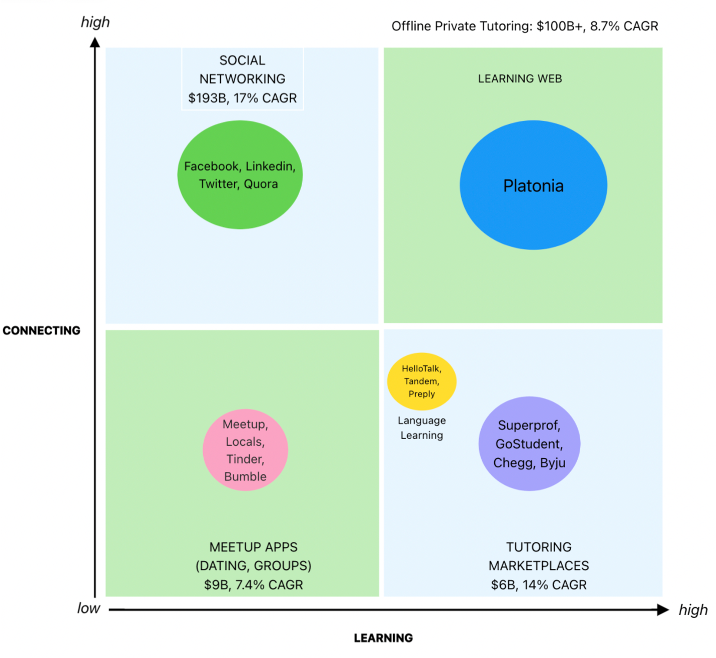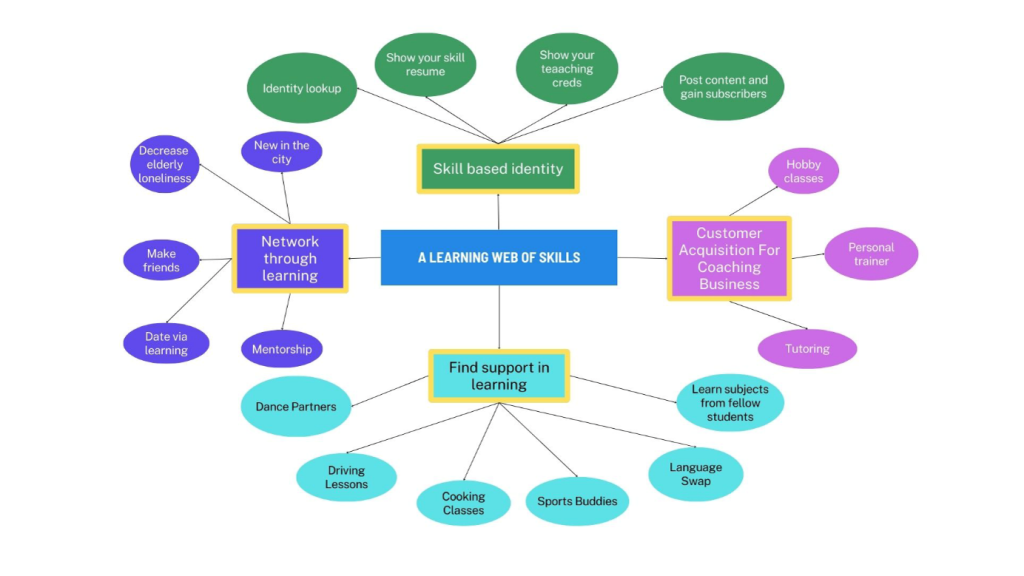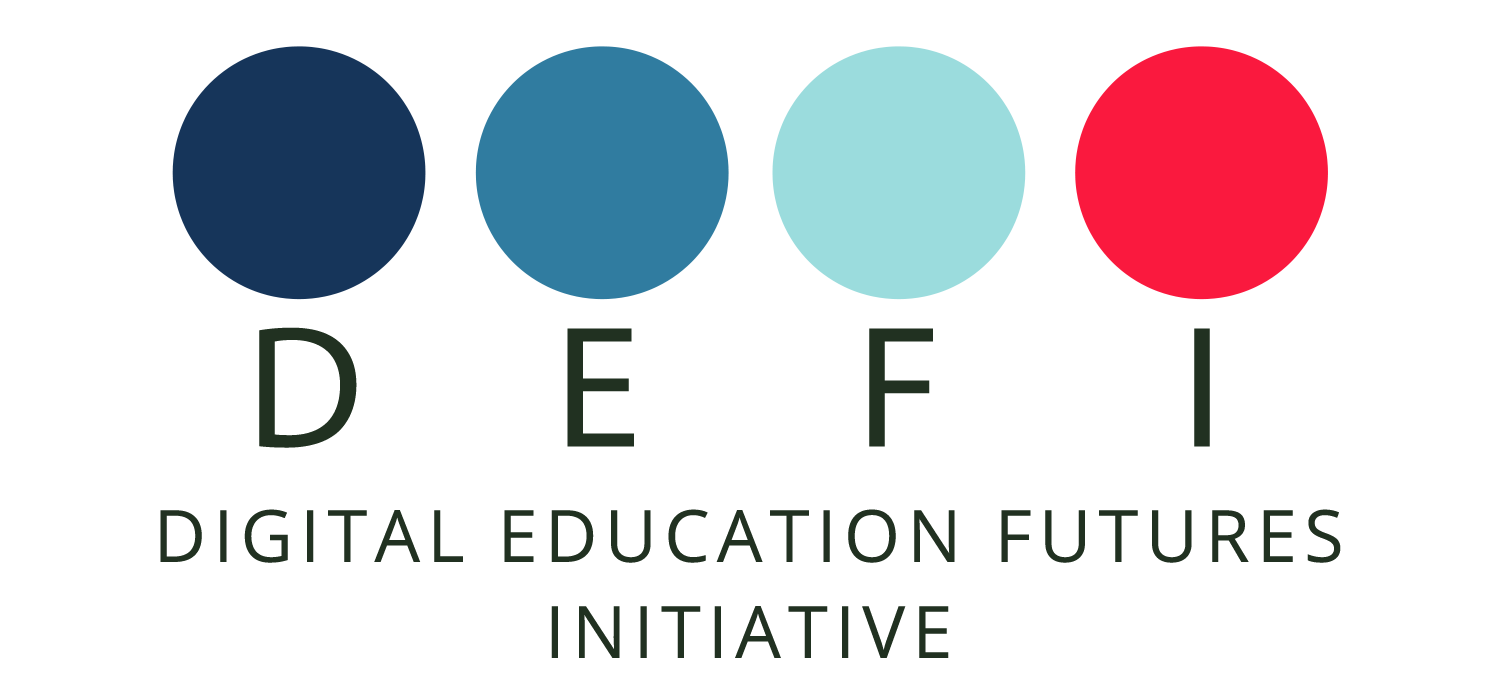Supported by Innovate UK, the UK government’s innovation agency, our latest blog is written by our new Entrepreneur in Residence, Piyush Ahuja. Find out more about Piyush here and read on to find out more about his innovative, dialogic platform.

Social graph offers cheaper alternatives, driving efficiency gains
I. The Power of Informal Learning Through Local Networks
My first year roommate was an International Informatics Olympiad medallist. Lounging about causally in the room, he helped me learn how to program. For free. And it was fun.
An elderly Chinese lady from my neighbourhood taught me how to care for my plants. She was full of little hacks like using Tesco yogurt cups and threads that retain water. It was connecting, it fostered community, and saved my plants from certain death.
I gave a friend her first driving lessons, taught my nephew sorting algorithms, and talked about how navigate in the wild on a first date.
Philosophers of education like Basil Yeaxlee have written prolifically about the power of association and the importance of local groups and networks in opening up and sustaining learning. The learning we have from our social networks are very different from schools or online learning. They are informal, voluntary, ad-hoc. They are often dialogic in nature, immediately useful, and foster connection. They have the quality of what philosopher Ivan Illich calls, “conviviality”.
Our local and social networks are especially suited for skills that require in-person guidance, instantaneous feedback or personalization. One can’t take an electronic device to a swimming pool while learning to swim. One does not want to hazard juggling an electronic device at the same time as learning to drive. One needs a real dance partner while learning to dance. And it helps if there’s someone looking over your shoulder when you learn to cook.
In the modern world of computers and AI, the learning from our social networks becomes even more important: as it centres itself on things that humans do better than computers, such as wisdom, creativity and dialogue, rather than on what smart computers do better, like remembering facts and doing analysis.
II. Introducing: Platonia
Every single person around us has skills to offer. These include the language they speak, the recipes they can cook, the sports they play, the music they practice, the dances they dance, their professional skills, the courses they learnt in school, or any from the vast array of the little know-hows one picks up in life.
More and more of our real life relations and interactions have moved online. Many platforms on the Internet allow people to connect. These connections take the form of friendships (Facebook), work colleagues and professional network relationships (Linkedin), and celebrity-follower (Twitter) or influencer-follower (Instagram) relationships .
No existing social networks are designed to support learning and teaching, and the connections that form through them. The student-teacher relationship as the force of long-lasting connection is not baked into any online network.
How do we tap into the learnings and skills that our local and social network have to offer?
At Cambridge Innovation Labs, we are building a product in response to this core need – an innovative “learning web”: Platonia.
Platonia would allow you to form connections through supporting others in learning a skill. Unlike any other social networks, it has skills and the student-teacher relationship baked into the heart of its database and tech architecture, as a first class citizen. This architecture and data unlocks a wide number of real life use cases that are yet to find a home in the digital world: language swaps, community cooking classes, neighbourhood driving lessons, mentorship sessions, finding dance partners or gym buddies, skill-exchange dating, among others.

III. A Realization of Ivan Illich’s Learning Web
Platonia is a realization of Ivan Illich’s idea of a Learning Web.
In Deschooling Society, Ivan Illich argued that a good education system should have three purposes: to provide all that want to learn with access to resources at any time in their lives; make it possible for all who want to share knowledge etc. to find those who want to learn it from them; and to create opportunities for those who want to present an issue to the public to make their arguments known .
He suggests that three distinct channels that facilitate this, which he called “learning webs”:
- Skill exchanges – which permit persons to list their skills, the conditions under which they are willing to serve as models for others who want to learn these skills, and the addresses at which they can be reached.
- Peer-matching – a communications network which permits persons to describe the learning activity in which they wish to engage, in the hope of finding a partner for the inquiry.
- Reference services to educators-at-large – who can be listed in a directory giving the addresses and self-descriptions of professionals, paraprofessionals and freelances, along with conditions of access to their services. Such educators… could be chosen by polling or consulting their former clients.
Realizing Ivan Illich’s vision was not possible during his lifetime, but the expansion of Internet and the modern database technology has made it possible now. Through Platonia, our mission is to realize this vision on a worldwide scale.

Data from our experiments to show that social graph offers cheaper alternatives
IV. A Learning Web as a Profile of Record
A “profile of record” is the application one uses after you meet someone to look them up.
Various online networks like Facebook, Instagram, Linkedin, Twitter, TikTok and Quora provide such a profile of record. Underlying each product is an idea of social identity:
- Facebook: Our social identity is our group of immediate friends, acquaintances and everyday statuses we chose to share.
- Twitter: Our social identity is the thoughts and insights we share with the world.
- Instagram: Our social identity is our awesome life experiences we share with others through photographs and media.
- LinkedIn: Our social identity is our education, professional qualifications and CV.
- TikTok: Our social identity is entertainment we provide to others through short clips.
- Quora: Our social identity is around the topics which we are curious about and have questions and answers for.
However, there is a very important aspect of social identity that all these platforms miss: the everyday skills that I have and that might be of use to others. These include the language I speak, the food I can cook, the sports I play, the music I practice, the dances I dance, the courses I learnt in school or college, or any from the vast array of the little know-hows and how-tos I have picked up in life.
No social network presents this view of a person.
And yet, in many ways, this is what one’s identity in a society is: we band together as people, because of the mutual advantage we gain from each other’s natural talents and learned skills.
Social Identity on a Teaching-and-Learning Based Social Network
I search for Jane Doe, a person I might or might not know. I want to know: who really is Jane Doe? This is how the different products provide me a view of Jane:
| Product | Social Identity |
| Jane Doe is friends with Luis and Rodolfo, has shared news regarding her recent move to the Bay Area and a funny New Yorker article. | |
| Jane Doe visited Iceland and shared photos of glaciers and volcanos. | |
| Jane Doe has shared witty takes on diversity in the tech industry. | |
| Quora | Jane Doe asked questions about whether “maths was invented or discovered?” and answered questions on how to clear a tech interview. |
| TikTok | Jane Doe has attempted many trending dance videos. Jane seems fun. |
| Jane Doe is at Sequoia. She previous worked at Google and went to MIT. |
What is missing in all these representations of Jane is how can Jane be important to me as a prospective social connection who I can learn from. Here is what social identity would look like on a learning-and-teaching based social network:
Jane Doe can drive, swim, cook Indian cuisine, speaks English, can dance salsa and play badminton. She has been revising Quantum Physics for an exam and is looking for students to teach it to you just to understand it better herself. She is willing to offer one-off driving lesson for free, will give a lesson in cooking Butter Chicken in exchange for £5, and is looking for badminton partners. She is also interested in learning Hindi and needs someone to review her CV.
If I am searching for Jane Doe on a social network, it immediately tells me how Jane is useful to me, or how I can be useful to her, and it provides a straightforward basis on which we can connect.
Social Capital on a Teaching-and-Learning Based Social Network
| Product | Social Capital |
| Jane Doe’s friends and statuses and friend count. | |
| Jane Doe’s photographs of her experiences and follower count. | |
| Jane Doe’s witty takes and observations and follower count. | |
| Quora | Jane Doe’s quality of answers and follower count. |
| TikTok | Jane Doe’s entertaining dance videos and follower count. |
| The strength of Jane Doe’s CV. | |
| Platonia | Jane Doe’s friends and statuses and friend count. |
Here is what social capital would look like on a learning-and-teaching based social network:
Jane Doe has taught 103 students across 90 lessons and imparted 9 skills. Her average skill level is 9/10. She has learnt from 21 teachers across 18 lessons and gained 5 skills.

Profiles in Platonia v1.0
V. A Convivial alternative to Tutoring Platforms
There are a whole array of online platforms that serve as a marketplace for tutors.
What separates Platonia from a tutoring marketplace is the focus on learning through connection. Platonia is a “convivial alternative”, to borrow Ivan Illich’s term.
Tutoring platforms are often designed as a two sided marketplace, enabling professional relationships and monetary exchange between two heterogenous sets of users (tutors and tutees). In contrast to a learning web or network, they are not “convivial” and do not foster connection, mutuality and sociality — values that many philosophers of education consider crucial in learning. Additionally, they lean towards a more formal approach to education rather than non-formal approaches.
There are natural synergies between learning through social connection, or forming connections through learning. The social bonds formed from a learning-teaching based connection are strong, memorable and long-lasting. It is based on a real transfer of value: a sharing of know-how and skill. And in so far as a teacher learns from a student themselves, it is a creation of value: a bond that empowers and results in mutual growth. The bond has an underlying spirit of generosity, excellence and respect. Often it leads to life-long gratitude and friendship.
A social network built with the student-teacher connection as a first-class citizen will enable a differentiated, arguably stronger community. The network would be based on real value that users provide, a spirit of generosity and respect for excellence. It would bring personalised and lifelong learning as part of our social fabric, as a daily past-time. It would integrate education into the worlds of work, leisure and citizenship in a way that few institutions do.


VI. An Idea Whose Time Has Come
Platonia’s premise is that it should be possible to unlock dormant value in a person’s extra skills, just like Airbnb did with extra rooms in homes and Uber with extra space in cars.
The themes that Platonia addresses have recently appeared in some policy pronouncements around lifelong learning and the so-called learning society. Charles Leadbeater, an innovation consultant and education policy adviser, has argued: ‘More learning should be done at home, in offices and kitchens, in the contexts where knowledge is deployed to solve problems and to add value to people’s lives’.
In the age of anxiety around AI, Platonia empowers humans to do what they do best. Anyone with experience and knowledge to share can teach a class, and any place can be a classroom – a co-working space, coffee shop, garage or conference room. A world where one can learn anything from anyone, powered by an endless cycle of learning and sharing skills. A world where every community can be a campus, every address a classroom, and every person a student and teacher.

Prototype Demo
We’re currently recruiting and fundraising for Platonia. If you’re interested in working with us, or investing in us, please drop us an email at cambridgeinnovationlabs@gmail.com.


